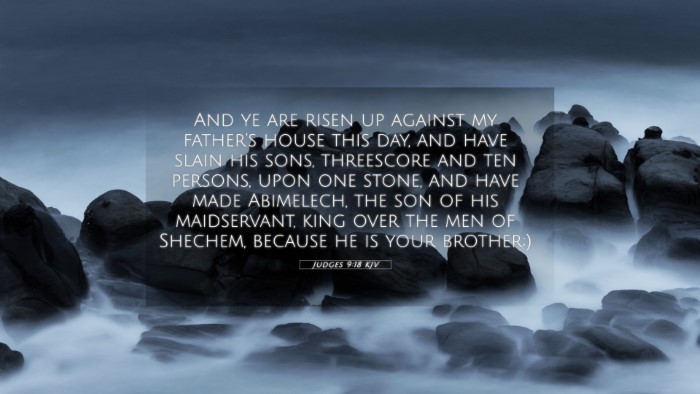Understanding Judges 9:18
Judges 9:18 states: "But you have risen up against my father’s house this day and have slain his sons, and have made Abimelech, the son of his maidservant, king over the men of Shechem, because he is your brother."
This verse showcases the treachery of Abimelech and the dynamics of power and familial relationships in ancient Israel. Below is a comprehensive analysis of its meaning, combined from esteemed public domain commentaries by Matthew Henry, Albert Barnes, and Adam Clarke.
Background Context
Judges 9:18 occurs in a narrative that details the rise of Abimelech, the son of Gideon, who is portrayed as an ambitious yet unscrupulous character. His ascent to power is marked by a violent overthrow of his half-brothers, showcasing the darker aspects of political ambition and conflict within a family.
Key Themes in Judges 9:18
- Betrayal: The verse highlights a profound betrayal, not only against family but also against the trust placed in Abimelech as he seeks power through violent means.
- Legacy and Family: The conflict in Judges 9 points to the broader themes of legacy, inheritance, and the impact of family ties on governance and leadership.
- Political Ambition: Abimelech’s actions serve as a cautionary tale about the lengths individuals may go to achieve power, often at the expense of ethical and moral standards.
Commentary Insights
Matthew Henry's Commentary
Matthew Henry emphasizes the folly of Shechem, who chose to elevate Abimelech without considering the moral implications of his violent methods. He notes how Abimelech's kingship is rooted in treachery, and Henry warns readers about the dangers of unchecked ambition, especially when it leads to bloodshed and betrayal of one's kin.
Albert Barnes' Commentary
Albert Barnes points out the irony present in this verse; although Abimelech was chosen by the Shechemites due to familial ties, his ascendancy involved the murder of his brothers. Barnes poses that the choice of Abimelech was politically motivated, contrasting the ideals of leadership, which should be founded on righteousness, with the reality presented here.
Adam Clarke's Commentary
Adam Clarke provides a deep psychological insight into Abimelech’s character, suggesting that his ambition led him to justify heinous acts for the sake of power. Clarke’s perspective aligns with the understanding of the destructive nature of ambition, particularly when family bonds are disregarded for personal gain.
Cross-References
Judges 9:18 connects with several important passages throughout the Bible, enriching our understanding of its themes. Here are key Bible cross-references that can deepen the thematic exploration:
- Genesis 37:19-20: The betrayal of Joseph by his brothers parallels Abimelech’s act of violence against his family.
- 1 Samuel 15:23: Disobedience and rebellion are likened to the finality of Abimelech’s revolt against God’s order.
- 2 Samuel 1:15-16: David’s attitude towards those who harm kin reflects the seriousness of Abimelech’s action.
- Proverbs 29:5: This verse indirectly speaks to the consequences of flattery and ambition, much like the support Abimelech received.
- Isaiah 14:12-14: The fall of Lucifer illustrates similar themes of ambition leading to downfall, resonating with Abimelech's story.
- Ezekiel 18:30: Calls for repentance and returning to righteousness, a theme missing in Abimelech’s choices.
- Luke 22:24: Disputes among the disciples showcase the struggle for power and authority similar to that in Judges.
- Romans 16:17: A warning against divisive individuals mirrors the betrayal in Judges 9.
- Galatians 5:15: Encouragement to not bite and devour one another, speaking to the consequences of internal strife.
- James 3:16: Where envy and selfish ambition exist, disorder follows, reflecting Abimelech’s chaotic rule.
Conclusion
Judges 9:18 serves not only as an event in Biblical history but also as a profound moral lesson about the dangers of ambition, betrayal, and a disregard for familial bonds. The insights drawn from the commentaries emphasize the importance of a responsible approach to leadership and governance. Through this verse, along with its cross-references, we witness the intertwining of human relationships and the divine order, inviting readers to reflect on their own lives and the choices they make.
Additional Resources
For those interested in exploring more about Bible cross-referencing and understanding thematic Bible verse connections, various tools and guides are available, such as:
- Using a Bible concordance to find related verses and themes.
- A cross-reference Bible study for in-depth exploration of interconnected scriptures.
- Implementing cross-referencing Bible study methods for effective sermon preparation.







